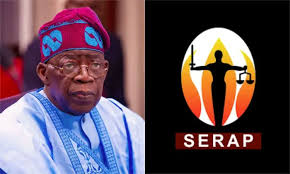The Socio-Economic Rights and Accountability Project (SERAP) has called on President Bola Ahmed Tinubu to reject a proposed $1.08 billion World Bank loan and instead prioritize investigating allegations of missing public funds. In a letter signed by its deputy director, Kolawole Oluwadare, SERAP expressed concerns over Nigeria’s rising debt profile, which has ballooned to ₦121.67 trillion as of March 2024, partly due to exchange rate fluctuations.
SERAP’s appeal comes amid revelations of widespread financial mismanagement in various government ministries, including the Federal Ministry of Humanitarian Affairs and Poverty Alleviation. According to the 2021 audited report by the Office of the Auditor-General of the Federation, over ₦57 billion was either mismanaged or unaccounted for in the ministry. This includes ₦54 billion intended for N-Power stipends, ₦2.6 billion for a school feeding program that was never executed, and other funds allegedly diverted or spent without proper documentation.
The organization also highlighted other instances of financial irregularities, such as ₦400 million meant for independent monitors’ stipends and ₦287 million paid to contractors without justification. SERAP has urged Tinubu to recover these funds and use them to address Nigeria’s budget deficit rather than resorting to further borrowing.
SERAP noted that Nigeria’s debt burden is unsustainable, with domestic debt at ₦65.65 trillion and external debt at ₦56.02 trillion as of June 2024. The group emphasized that borrowing more would only exacerbate the country’s economic challenges, urging Tinubu to impose an immediate moratorium on new loans.
In its letter, SERAP stated that addressing these allegations of corruption is not only a constitutional obligation but also critical to restoring public trust. The group warned that if no action is taken within seven days, it would consider legal measures to compel the government to act in the public interest.
This call comes as Nigerians continue to grapple with economic hardships and rising inflation, with many questioning the government’s reliance on loans amid allegations of mismanagement and corruption in public offices.
